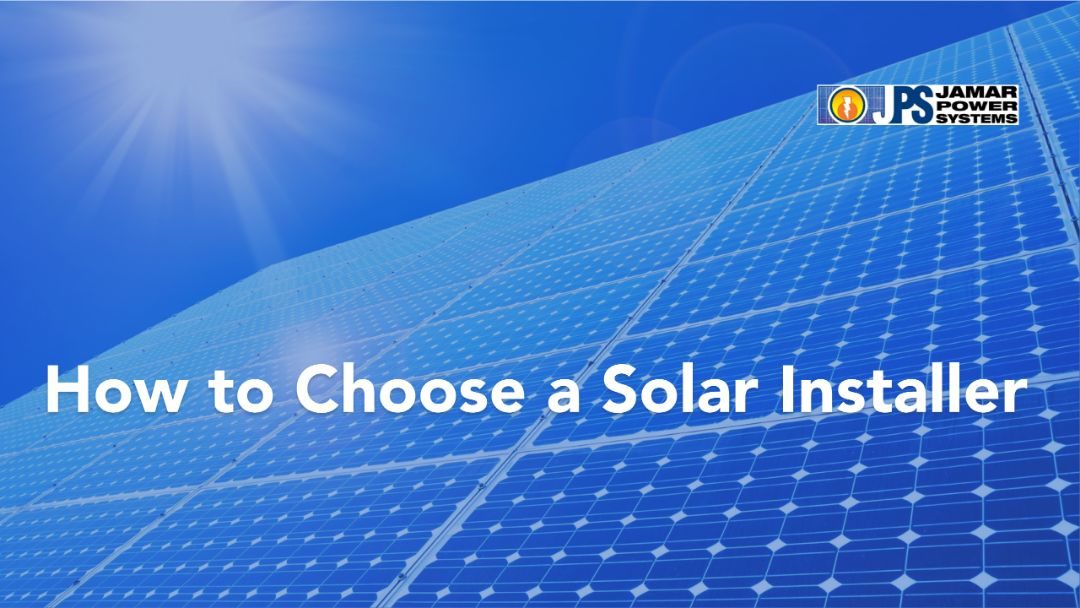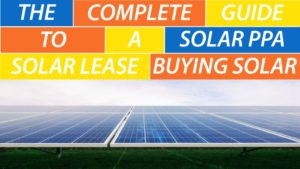How To Select A Solar Company
Congratulations on looking into solar energy to power your home to save your family money, and help make our air a little cleaner in the process.
The next step is finding a solar company that’s qualified, dependable, and has an excellent reputation.
Finding, interviewing, and choosing a skilled and reliable solar installer to work with is vital to a successful solar installation that will last for decades.
A quality solar contractor is also the key ingredient to a smooth process for any future repairs or warranty claims that may be needed.
There are a few things to consider when you’re looking to start getting quotes from solar companies that sell and install solar panel systems for homes.
This guide was designed to help you get the information you need to make a more informed decision on which solar company to select.
Be sure to get quotes and solar equipment recommendations from two or more solar installation companies to compare.
How will you finance the solar power system?
Your financing choice of cash, bank loan, solar loan, lease or power purchase agreements significantly affects which solar contractor to use.
Not all solar contractors offer all financing options, such as purchase loans, leases, and power purchase agreements.
See our “Complete Guide to Solar PPA, Lease, and Purchase” for more information.
Cash or Bank Loan
If you’re using your own money or a loan from your bank to buy a solar power system, then any quality and licensed solar contractor/dealer can help you.
Solar Loan
If you plan to use a solar loan, that financing will most likely come from the solar contractor, in which case you’ll be looking for solar contractors who provide solar loans. There are many zero-money-down solar loans available today.
Solar Lease or Power Purchase Agreement (PPA)
If you’ve decided a solar lease or power purchase agreement (PPA) is best for you, then you’ll need a solar contractor who offers those financing options.
Will You Install on Your Roof, Ground, or other structure?
A second important point is whether you plan to install the solar panels on your roof, the ground, or on top of another structure.
All solar companies install on roofs, but not all of them install ground-mounts or on patio covers, etc. If you need or desire either of the latter two, you’ll need to ask if the solar installer does them.
Will You Install A Battery Storage System?
An energy storage system can protect your vital electric needs in the event of a utility power outage or natural distaster. See our article on solar battery storage systems.
Should you choose a local or national company?
National companies like Tesla (formerly SolarCity), SunRun, and Vivint Solar are easy to find.
Local companies are more likely to provide better prices because you’re not paying for all that national advertising.
Local companies are also more likely to provide better customer service and superior quality workmanship.
It’s easier for small companies to maintain quality control than a national company with a large workforce.
A local company is also more dependent on growing its business through referrals instead of advertising, and only quality work gets referrals.
Ask friends, associates, and neighbors.
Have they had a solar energy system installed? Were they’re satisfied with the job the company did? Did they keep the job site clean? Did they communicate well? Have they had to follow up for any repairs or other issues?
Contractor Question #1: Do you offer solar loans (if applicable)?
If so, with whom and what are all terms? Get details and compare with your other loan choices.
Contractor Question #2: Do you offer a solar lease or power purchase agreement PPA (if applicable)?
If so, with whom and what are all terms? What is the lease or PPA payment? Does the payment amount go up ever? What guarantees are in the contract?
You will likely need to get a customized quote to get to see all the details of the contract.
Make sure your solar company explains your financing options. Be careful when your only options with them are a lease or PPA. Most consumers will experience greater financial benefits when purchasing over leasing and PPAs. Buyer beware, most arguments made to support a lease or PPA are sales hype designed to sell them.
See our Complete Guide to Solar PPA, Lease, and Purchase for more information.
Contractor Question #3: Do you have a local office and warehouse I can visit?
Screen out companies that don’t have an office location or don’t want you coming there. You need a company that will be around for decades, not one that you can’t even visit today.
A company that maintains a warehouse with an inventory of parts, solar panels, inverters, enables smoother and faster installation times.
Contractor Question #4: How many years has your company been installing solar power systems?
Look for stability, the longer they’ve been in business, the more likely they are to stay in business and be there for any future warranty work needed.
Contractor Question #5: How many residential solar power systems have you installed?
Have they completed dozens, hundreds, or thousands of solar power installations?
Contractor Question #6: Have you installed any in my town?
Familiarity with local city building permit office and procedures helps for a smoother permitting and inspection process.
Contractor Question #7: What local references can you provide?
Get at least three local homeowner references for whom they’ve installed solar power systems. Contact each for feedback on their satisfaction with the company, process, products, and power generation.
Contractor Question #8: What type of contractor’s license do you have, solar or electrical, or both?
They must have a California solar contractor’s C-46 license or an electrical contractor’s C-10 license.
Contractor Question #9: What is your license number?
They must supply this to you by law. Check their license with the CA State Contractors Board to make sure it’s current, and that they have proper insurance.
Click here to check their license with the CA State Contractor’s License Board.
Avoid all companies that do not have an active C-46 or C-10 contractor’s license.
Contractor Question #10: What insurances do you carry?
They should have Worker’s Compensation and General Liability insurance policies. Ask for a copy of their insurance certificates.
Contractor Question #11: Do they use sub-contractors for any part of the job? If so, what are their contractor license numbers?
Carefully scrutinize any company that uses sub-contractors because sub-contractors can add liens to your property if the solar company does not pay them.
The use of subcontractors may reflect the fact that the company itself doesn’t have the expertise to do all or part of the job. If they use subcontractors, find out why and what their contractor license numbers are.
It’s common for solar companies to use sub-contractors for any significant re-roofing work that might be needed. Roofing is a different skillset, and you should prefer a licensed roofer to do any major re-roofing work that’s required.
It’s also common for solar-only licensed companies to outsource replacing the home’s main electrical service panel if needed. The upgrade or replacement of your electrical service is work for a licensed electrician.
Contractor Question #12: What is their workmanship warranty?
California requires a minimum of one year warranty from the contractor to cover the installation and materials used in the installation. Workmanship warranties can vary widely and usually range from 1 to 10 years. The longer, the better.
What is their warranty if you have roof leaks after installation?
Many companies will warranty against roof leaks under the solar installation and for a distance around the mounting brackets. Get their workmanship warranty and compare.
Here’s a link to learn more about our ten (10) year workmanship warranty for solar installations.
Contractor Question #13: What makes them different than every other solar company?
What makes them better? Why should you choose them?
Contractor Question #14: Do they have experience with your city’s building permit office?
How long does it usually take for that office to issue permit approval?
Contractor Question #15: What solar panel manufacturers and models do you offer and recommend?
Not all solar panels are created equal. Like every other product, there are low-quality and high-quality options.
Solar panels will sit on your roof and exposed to the weather for 25 to 40 years; they need to be made to last.
There are three common types of solar panel (PV modules):
- Amorphous – very cheap, low efficiency and durability.
- Polycrystalline – blue color – better quality efficiency and durability than amorphous but not the best.
- Monocrystalline – highest quality, durability, and efficiency and usually the best choice. Required if you have limited roof space.
Beware low-quality options that are cheap up-front but cost more over time due to repairs and replacements. If the manufacturer of cheap PV panels goes bankrupt, as they often have, there’s nobody to stand behind their warranty.
For more information about the differences in solar panels see our article, “How much do solar panels cost?“
Contractor Question #16: What are your best quality solar panels?
They will likely have good, better, and best options.
There are high-efficiency solar panels that produce more power per square inch of roof, which is critically important if you have limited roof space.
Contractor Question #17: What are your best value solar panels?
The latest PV modules often come at a premium price. Ask the solar contractor if they have a previous model or stock a solar panel they consider to be a better value for the dollar?
product and power warranties of each recommended solar panel?
Solar PV panels have two (2) warranties:
- A power warranty that guarantees a minimum power output after 25 years of operation of at least 80 percent of the original energy produced. The State of California requires all solar PV panels provide this minimum power output warranty.
- A product warranty, which warranties the PV panels against defects in the materials or workmanship. Scrutinize this warranty as they vary from 10 to 25 years and may or may not include labor and shipping costs associated with warranty repairs.
The biggest difference in solar panel warranties will be with the PRODUCT warranty.
Beware of solar salespeople who tell you all solar panels have 25-year warranties. That only applies to the power output required by the state of California, but NOT the product warranty as described above. Sadly, it’s common for solar salespeople to have little knowledge of their products and provide consumers with misinformation.
Look for high-efficiency solar panels that come with both a 25-year power warranty and a 25-year product warranty (against defects and workmanship).
Contractor Question #19: What inverter(s) do they offer and recommend?
Inverters convert the direct current (DC) electricity that solar panels produce into alternating current (AC) electricity that our homes and businesses use.
The inverter’s efficiency rating details the percentage of DC power converted into AC power. The best quality inverters convert 95% or more of the energy produced into usable AC electricity.
There are three types of inverters:
- Box inverter – a single box-shaped unit where the wiring from all solar panels leads. SMA makes the best quality and highest-efficiency box inverters.
- Micro-inverter – this is a little inverter that is either built into or gets attached to each solar panel. Enphase makes the best micro-inverter products with the best warranty.
- Power optimizers – each solar panel is connected to an intelligent electronic chip that maximizes the energy production from each PV panel to reduce power losses. Solar Edge is the leading company in this space.
Note: Micro-inverters and Power Optimizers can make using every part of your roof easier if you have limited roof space.
Contractor Question #20: What is the warranty for their recommended inverter(s)?
Warranties for box inverters are usually for ten (10) years and warranties for micro-inverters and power optimizers are usually for twenty to twenty-five (20-25) years.
Contractor Question #21: Is production and consumption monitoring included with the solar power system?
The monitoring of the power output of your solar energy system is included with most high-quality systems.
Most systems will provide a phone or tablet application that you can download. The monitoring app allows you to see the hourly, daily, weekly, monthly, and annual energy production data of your solar energy system.
Some apps also include monitoring of your electricity consumption, which allows for analysis and adjusting your electricity use toward peak times of solar energy production.
Monitoring systems usually come with a five (5) year warranty.
Future Repairs
Contractor Question #22: Who will perform any warranty repairs that may be needed in the future?
It should be the same company that installs your system. If not, ask who you would contact for repairs?
Contractor Question #23: Will you perform a site survey on my property?
Do they send someone to your home to survey the roof or ground mount area, main electrical service panel, and examine your electric bills?
A site visit is preferred to confirm any proposals will be accurate.
For more information on how big a solar power system you need, see our article, “How many solar panels do I need?”
Remaining Electric Utility Bill
Contractor Question #24: What will our monthly electric utility bill be after solar is installed?
Unless you’re installing an off-the-grid solar power system, you’ll still be connected to the electric utility grid to draw power from at night or when your electricity consumption exceeds solar energy production. There will still always be an electric utility bill, and you need to know what the projections are.
With Net Energy Metering (NEM), you’ll get utility company credits for any electricity your system sends into the electric grid. Those credits get used when you take energy from the electric grid.
If your roof space allows for enough solar panels to be installed to accomplish a full offset of your electricity usage, then you’ll have a minimal electric bill remaining.
Ideally, the combination of the new solar payment plus the projected reduced electric utility bill will equal LESS than what your current average electric utility bill is.
Company Reputation
Check online reviews for what customers say about this company. See what past customers have to say about their experience with the company.
Check these sites for customer reviews:
Google
Yelp
BBB
Solar Reviews
Angie’s List
HomeAdvisor
How many online customer reviews do they have?
What’s their average rating?
Are there plenty of reviews when looked at across several sites? Are there several bad reviews?
Did the solar company respond to any bad reviews? How was that response?
Do they have many bad reviews or complaints? In addition to online reviews, also look at the Better Business Bureau for any potential consumer complaints. If there are complaints, how were they handled?
Contracts
Be sure the company name on the solar contract matches the name of the company you’re negotiating with. If not, then they’re probably outsourcing the entire job, in which case caution is advised.
Know your rights and beware of ethically-challenged salespeople and contractors by asking questions and reading all documents BEFORE signing anything.
California law requires that every solar contractor must provide you with the following documents to review and sign BEFORE you sign any solar or financing contracts
- A Solar Contract with all cost, terms, and conditions stated clearly.
- CA Solar Disclosure Document that shows the total costs for the solar energy system (available in English and Spanish).
- California Public Utilities (CPUC) Consumer Guide to Solar (must be signed BEFORE any contracts or financing).
Additional resources:
- San Diego Solar Calculator
- SDG&E Solar Phone Number: 1-800-411-SDGE
- SDG&E Get Started with Solar
- SDG&E Understanding Your NEM Statement
- SCE Solar Phone Number: 866-600-6290
- SCE Solar Power at Home
- SCE Understanding N.E.M. and Your Bill
- PG&E Solar Customer Service: 1-877-743-4112
- PG&E Clean Energy
- CPUC NEM Overview
Contractor’s State License Board (CSLB)
- Check a Contractor License or Home Improvement Salesperson Registration with the CA State Contractor’s License Board License Check website.
- How Solar Batteries Work - March 4, 2024
- Solar Battery or Generator for Emergency Backup Power? - January 30, 2024
- How to Check If Your Solar Panels Are Charging The Solar Battery - January 12, 2024



